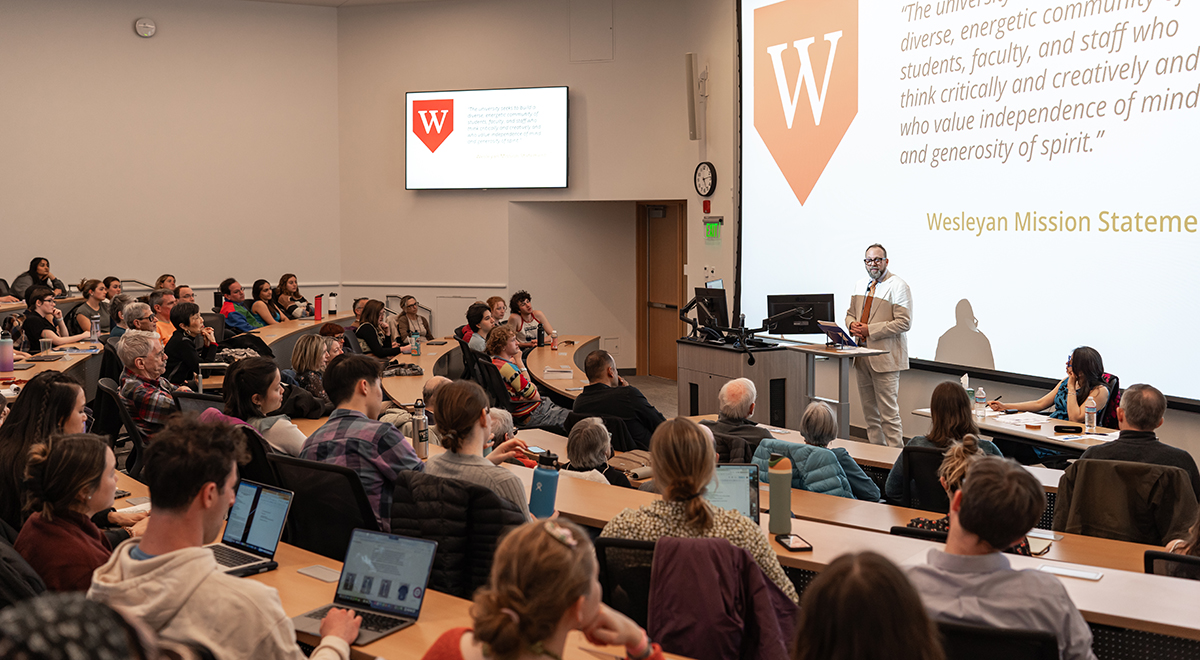
c/o Wesleyan Connection
On March 25, the University’s annual Hugo L. Black Lecture on Freedom of Expression hosted Carleton College professors Amna Khalid and Jeff Snyder to analyze academic freedom in higher education in a presentation entitled “Free Speech for Me, But Not for Thee: Campus Censorship from the ‘STOP WOKE ACT’ to Israel-Palestine.” Sponsored by the Allbritton Center for the Study of Public Life and introduced by Dean of Social Sciences Mary-Jane Rubenstein, the Hugo L. Black Lecture is an annual on-campus event that attracts public figures and scholars involved in the national First Amendment debate.
Universities across the country have been engaging in a debate around what professors and students can say, when they can say it, and whom they can say it to, particularly with regard to the ongoing war in Gaza. After being introduced by Rubenstein, Khalid and Snyder addressed the First Amendment’s past and present during their presentation, speaking to a group of roughly 50 University faculty and students.
“Without free expression on campus, you no longer have an educational institution,” Snyder said. “[You have an] industrial institution or a factory, which would just reproduce the state of existing knowledge. It would be a form of indoctrination, not a form of education or liberation.”
Khalid is Associate Professor of History and Director of Asian Studies at Carleton College, specializing in South Asian history and the history of medicine. As a young girl growing up alongside Pakistani military dictatorships, Khalid developed an interest in free expression and speech issues. She currently hosts a podcast called “Banished,” where she explores academic freedom, free expression, campus politics, and the culture wars, and she has published essays in outlets such as the Chronicle of Higher Education, the Conversation, Inside Higher Ed, and the New Republic.
Snyder is an Associate Professor of Educational Studies at Carleton College. He is a self described educational historian, specializing in academic freedom, free expression, and their roles on liberal arts college campuses. Snyder’s recent work includes “Making Black History: The Color Line, Culture and Race in the Age of Jim Crow,” which examines how the celebration of the Black past affected the lives of African Americans during the Jim Crow era.

c/o Wesleyan Connection
In the lecture, they discussed ideology and legislation, like the Stop WOKE Act in Florida, that restrict curricula. These censor not only the views teachers can present to their classes, but also historical primary source documents, due to their potential to cause students psychological distress.
Khalid believes that the Stop WOKE Act and similar legislation remove crucial independent thinking skills from the learning experience. As a scholar in South Asian history, Khalid argued that engaging with relevant material is critical to learning topics such as the rise of fundamentalism in the region.
“The tragedy is, at the end of the day, it’s not just the professors who are losing out, it’s really the students who are losing,” Khalid said in an interview prior to the lecture.
The lecture also cited statistics such as a staggering 33% increase in public K-12 school book bans in a single year, particularly involving bans of texts with themes of race, gender, and LGBTQ characters. Additionally, over 300 gag order bills concerning gender and race were introduced in 46 state legislatures, furthering the censorship of teaching materials and civic engagement projects. Snyder emphasized that limiting curricula hinders open discussion and the search for truth.
“Without academic freedom, there is no exchange of ideas,” Snyder said. “There would be no ability of researchers to share findings that challenge the status quo, or even have their findings peer-reviewed.”
Promoting academic freedom takes work on the part of students and faculty, according to Khalid and Snyder. Voicing informed opinions, including challenging ones, is critical for a more diverse and productive University community. Students appreciated the candor of the lecture and felt it was relevant to today’s educational and political climate.
“I learned that it’s important that speech can confront us with viewpoints that provoke discomfort,” Kaylin Maher ’26 said. “Allowing these different perspectives to be expressed creates a ground for dialogue and understanding.”
Carolyn Neugarten can be reached at cneugarten@wesleyan.edu.